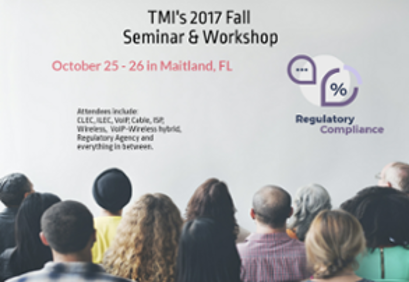 Today: Lifeline Awareness Week, California Resolution on Net Neutrality, FCC Chairman Pai Names September “Modernization Month”, FCC Hurricane Irma Updates
Today: Lifeline Awareness Week, California Resolution on Net Neutrality, FCC Chairman Pai Names September “Modernization Month”, FCC Hurricane Irma Updates
Lifeline Awareness Week
The Public Utilities Commissions of Ohio and Pennsylvania, the Public Service Commission of Georgia, and the Washington Utilities and Transportation Commission (among others) are participating in National Lifeline Awareness Week, Sept. 11–17, 2017, reminding low-income telephone consumers that assistance is available to stay connected to local resources and emergency services. In addition to the states, the FCC, National Association of Regulatory Utility Commissioners, and the National Association of State Utility Consumer Advocates are committed to increasing awareness about the availability of the Lifeline Assistance program.
California Resolution on Net Neutrality
The California legislature enacted Resolution Chapter 151 on September 12, 2017. The resolution urges President Trump and Members of Congress to continue to protect net neutrality, open Internet access, the federal Lifeline program’s discounted telephone service for qualifying low-income consumers, and the E-rate program’s discounted telecommunication and Internet access services for schools and libraries. It declares that the Legislature views these as high priorities for California and the country, and opposes any federal efforts to rescind or block them.
FCC Chairman Pai Names September “Modernization Month”
In a blog posting announcing the agenda for the FCC’s September meeting See the Regulatory Mix dated 9/8/17, FCC Chairman Ajit Pai elaborated on many of the items to be considered at that meeting. “Since becoming Chairman, I have consistently emphasized the need for the Commission’s regulations to match realities of the current marketplace. Our rules must reflect today’s technological and economic conditions, not those of yesterday. And at this month’s open meeting, we will advance this objective by focusing on whether to update or scrap outdated rules. That’s why we’re dubbing September Modernization Month at the FCC.”
 FCC Further Expands DIRS For Hurricane Irma
FCC Further Expands DIRS For Hurricane Irma
The FCC has extended its data collection under DIRS to include all counties in Florida and parts of Georgia and Alabama.
The Florida counties are as follows:
Alachua, Baker, Bay, Bradford, Brevard, Broward, Calhoun, Charlotte, Citrus, Clay, Collier, Columbia, Desoto, Dixie, Duval, Escambia, Flagler, Franklin, Gadsden, Gilchrist, Glades, Gulf, Hamilton, Hardee, Hendry, Hernando, Highlands, Hillsborough, Holmes, Indian River, Jackson, Jefferson, Lafayette, Lake, Lee, Leon, Levy, Liberty, Madison, Manatee, Marion, Martin, Miami-Dade, Monroe, Nassau, Okaloosa, Okeechobee, Orange, Osceola, Palm Beach, Pasco, Pinellas, Polk, Putnam, Santa Rosa, Sarasota, Seminole, St. Johns, St. Lucie, Sumter, Suwannee, Taylor, Union, Volusia, Wakulla, Walton, Washington
The 18 Georgia counties are as follows:
Baker, Brooks, Camden, Charlton, Clinch, Colquitt, Decatur, Early, Echols, Glynn, Grady,
Lanier, Lowndes, Miller, Mitchell Seminole, Thomas, Ware
The 3 Alabama counties are as follows:
Geneva, Henry, Houston.
FCC Releases Latest Hurricane Irma Status Report
The FCC released another status report on communications services in geographic areas impacted by Hurricane Irma as of September 12, 2017. The report incorporates network outage data submitted by communications providers to the FCC’s Disaster Information Reporting System (DIRS) for all areas of Florida, Puerto Rico, the U.S. Virgin Islands, and parts of Georgia and Alabama. The report indicates that: (1) there were a total of 29 PSAPs affected by the storm in Florida and 2 affected in the US Virgin Islands; (2) 53.8% of the cell sites in the US Virgin Islands, 24.6% of the cell sites in Florida, 14.5% of the cell sites in Puerto Rico, 10.5% of the cell sites in the affected areas of Georgia, and less than 1% of the cell sites in the affected areas of Alabama were out of service with counties in all states/territories other than Alabama reporting some counties with more than 50% of their cells sites down; (3) there are at least 7,184,909 consumers without either cable or wireline service in the affected areas in Alabama, Florida, and Georgia; (4) there are 819 non-mobile switching centers out in Florida and none in Alabama and Georgia; and (5) there are a total of 9 broadcast stations reported out of service; and (6) there are a total of 51 radio stations out of service.
FCC Grants Hurricane Irma Lifeline Waivers
The FCC granted a temporary waiver of the Lifeline Program’s non-usage and recertification rules for all eligible telecommunications carriers (ETCs) serving Lifeline customers residing in Puerto Rico and the U.S. Virgin Islands and the state of Florida. The waiver will be in effect for 90 days. As of June 2017, there were approximately 518,000 Lifeline subscribers in Puerto Rico, 2,500 Lifeline subscribers in the U.S. Virgin Islands, and 676,276 Lifeline subscribers in Florida. The non-usage rule requires ETCs to de-enroll Lifeline subscribers who do not pay a monthly fee for their Lifeline-supported service and do not use that service for 30 consecutive days. Recognizing that the hurricane would make it difficult for subscribers to respond to ETCs’ recertification requests, the FCC also waived the recertification rule for ETCs with subscribers whose service anniversary dates fall within the next 90 days. At the expiration of the 90-day waiver period, subscribers whose service anniversary dates fell during the waiver period will have 60 days to respond to their ETC’s recertification effort.
____________________________
The Regulatory Mix, TMI’s daily blog of telecom related regulatory activities, is a snapshot of PUC, FCC, legislative, and occasionally court issues that our regulatory monitoring team uncovers each day. Depending on their significance, some items may be the subject of a TMI Briefing.





